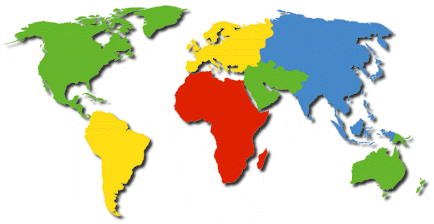
|
|
|
|
|
|
|
|
|
|
Descriptions of varieties
(Click on the flag for more detailed information)
|
Hawai‘i Creole English, locally known as 'Pidgin', is spoken by at least 600,000 people in the U.S.A. state of Hawai‘i. It is an important marker of local identity, and is used widely in literature. |
|
African American (Vernacular) English (AAVE), also called 'Ebonics', is a minority dialect spoken by most African Americans thoughout the U.S.A. It is a marker of ethnic identity, and also a symbol of a youth culture (though rap and hiphop music). |

|
Papiamentu is a creole language spoken by about 200,000 people on the Caribbean islands of Aruba, Bonaire, and Curaçao, whose flags are shown here. (Bonaire and Curaçao are politically part of the the Netherlands Antilles.) Papiamentu is a co-official language (alongside Dutch) on all three islands, and serves as the language of daily life, used in homes, markets, TV, radio, newspapers, literature, churches, and, to a limited extent, in schools. Each island has a slightly different dialect. On Aruba, people speak 'Papiamento', not 'Papiamentu'! |
|
'Geordie' is a regional dialect of English spoken in Tyneside, the region around the River Tyne in northeastern England, dominated by the city of Newcastle. |
 |
Naijá (Nigerian Pidgin) has more speakers than any other expanded pidgin or creole – more than 80 million, throughout the most populous country in Africa. |
|
Kamtok
(Cameroon Pidgin) is spoken by over |
|
Krio is a creole that is the native language of less that 10 % of the population of SIerra Leone (on the coast of West Africa). But it is also learned as a second language and widely used as a lingua franca throughout Sierra Leone and in neighbouring countries. |
|
'Singlish' is an indigenized variety of English spoken informally in Singapore. It is mostly spoken as a second language, but is now a common native language in Singapore. |
|
Aboriginal English is the name given to the different forms of the minority dialect spoken by Aboriginal people in Australia. It is an important marker of ethnic identity. |
|
Tok Pisin is the dialect of Melanesian Pidgin spoken by more than 2.5 million people in Papua New Guinea. It is used in the broadcast and print media, and in parliamentary debate. |
|
Bislama is the dialect of Melanesian Pidgin spoken by over 120,000 people throughout Vanuatu. It has been declared the national language of the country. |
|
Trinidad French Creole is spoken on the island of Trinidad in the Republic of Trinidad & Tobago. In contrast to most of the Language Varieties in this site, its vocabulary comes mainly from French, not English. |













